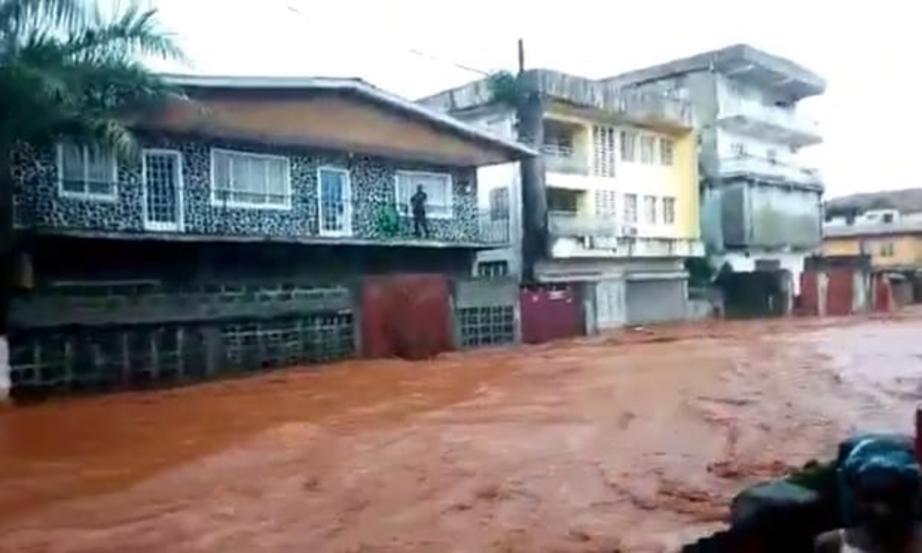Hundreds killed after Sierra Leone mudslide
Hundreds of people have been killed in a mudslide near Sierra Leone’s capital, Freetown.
A hillside in Regent, a mountainous town 15 miles east of Freetown, collapsed in the early hours of Monday morning after heavy rains, leaving hundreds of people trapped. Morgues in the capital have been overwhelmed with bodies, while relatives have been left to dig through the mud in search of remains.
Death tolls are unconfirmed, although the International Federation of Red Cross reports that 312 have been killed and more than 1,000 affected. Disaster officials in Sierra Leone have estimated 2,000 people have been left homeless.
“It is likely that hundreds are lying dead underneath the rubble,” Victor Foh, the country’s vice-president, told Reuters at the scene of the mudslide in Regent, adding that a number of buildings had been erected illegally in the area.
“The disaster is so serious that I myself feel broken. We’re trying to cordon [off] the area [and] evacuate the people.”

A shot from a video showing the area after the mudslide. Photograph: Society 4 Climate Change Communication Sierra Leone
An Agence France-Presse journalist saw bodies being carried away and houses submerged in mud in two areas of the city, where roads were turned into churning rivers.
Kelfa Kargbo, country director in Sierra Leone for the organisation Street Child, which is assisting with the recovery, said the mudslide started at 3am when a heavy downpour covered Freetown, bringing down all the houses built along the side of the hill in Regent. “It had a domino effect for a distance of about two miles. The mud came down burying people alive, bringing down houses, bringing down big buildings.”
Throughout Monday, searches for bodies were carried out by residents, emergency workers and the military.
Street Child understands that no survivors have been dug up since 7am in the morning. Kargbo said: “Construction companies have brought in their power tillers to help dig up bodies. There’s no equipment. This is unprecedented and Sierra Leone was ill-prepared for such a catastrophe.”
The Red Cross and the government are moving the bodies to a holding centre at Connaught hospital in Freetown, which is overwhelmed by the level of need. Families have been asked to go to identify bodies, but most are continuing to search for survivors.
“Rather than going and identifying bodies, they’re digging up bodies and looking – maybe there will be a few who are alive in there. No burial has happened at the moment,” Kargbo said. “It’s so horrific because some bodies are just only legs with no body. Some you could see just the head. It’s appalling.”
Mohamed Sinneh, a morgue technician at Connaught hospital, said at least 180 bodies had been received, many of them children, leaving no space to lay the dead because of the “overwhelming” number of bodies at the facility. More bodies were taken to private morgues, he said.
Sierra Leone’s national television broadcaster interrupted its regular programming to show scenes of people trying to retrieve the bodies of their loved ones. Images shared by local media showed people waist-deep trying to cross streets of flowing water.
Fatmata Sesay, who lives on the hilltop area of Juba, said she, her three children and husband were woken at 4.30am by rain beating down on their mud house, which was already submerged by water. She managed to escape by climbing on to the roof. “We have lost everything and we do not have a place to sleep,” she told AFP.
Tom Dannatt, the CEO of Street Child, has launched an emergency appeal to support those affected. “Urgent actions are needed,” he said. “The current death toll has risen to over 300 and over 300 houses have been destroyed. These communities need our help.”
Prospective presidential candidate for the All People’s Congress, John Bonoh Sisay, said: “My thoughts and prayers are with those affected by the heavy flooding in the areas surrounding Freetown. As the emergency services continue to take steps to reach and help all vulnerable people, I urge everyone in the affected areas to try to stay safe and calm during this tough time. We stood together as a country and won the fight against Ebola. Together, we will overcome this too.”
Flooding is an annual threat in Sierra Leone, where unsafe housing is regularly swept away during the rainy season. In the capital in 2015, floods killed 10 people and left thousands homeless.
“There is little to no urban planning going on in the city at all levels of society,” said Jamie Hitchen, of the Africa Research Institute. “The government is failing to provide housing for the poorest in society. There is a chronic housing deficit in the city and the issues only get discussed on an annual basis when flooding happens and [it] comes into the spotlight.”
Although the government has relocated some communities from informal housing, these are often forced resettlements which leave residents on the outskirts of the city so many soon return to their original homes.
Abdul Tejan-Cole, the former commissioner of Sierra Leone’s anti-corruption commission, tweeted: “Floods once again expose bad planning and lack of a national emergency management system.”
The UN in Sierra Leone tweeted that it was “assessing damage, preparing response”.
The British high commissioner in Sierra Leone, Guy Warrington, tweeted: “My thoughts are with the people of Salone at this difficult time.”
For the rest of this article please go to source link below.
Video can be accessed at source link below.
